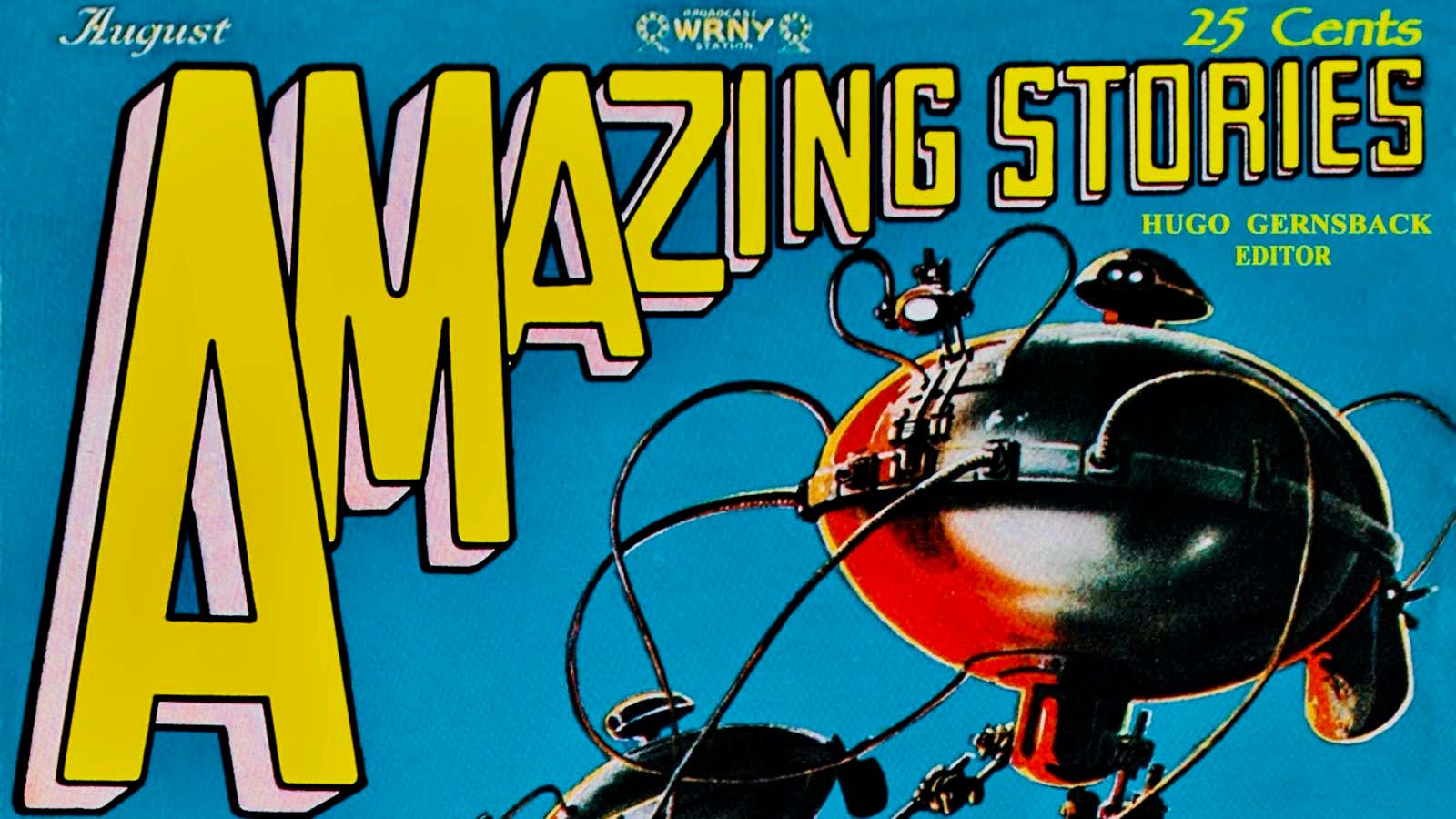We know now that in the early years of the twentieth century this world was on edge, teetering on the verge of a war of massive proportions. As Americans listened to CBS radio on Oct. 30, 1938—80 years ago today—they heard about alien intelligences who were “vast, cool and unsympathetic, regarding this earth with envious eyes.”
We know now that this was a 1917 science fiction by HG Wells called The War of the Worlds, narrated by the filmmaker Orson Welles. And we think we know now that Americans panicked en masse, terrified of a Martian landing because the show sounded like standard radio programming interrupted by an emergency:
“Ladies and gentlemen, we interrupt our program of dance music to bring you a special bulletin from the Intercontinental Radio News,” the announcer said. ”I have a grave announcement to make. Incredible as it may seem, both the observations of science and the evidence of our eyes lead to the inescapable assumption that those strange beings who landed in the Jersey farmlands tonight are the vanguard of an invading army from the planet Mars.”
What most don’t know, however—even now, eight decades later—is that this legendary radio show didn’t actually prompt national hysteria, although that myth has persisted for decades.
The scare about the science fiction was what we now call fake news, an after-the-fact sensation created by newspapers promoting the notion that radio was a dangerous medium so they could win back advertising dollars lost to broadcasters whose platform grew ever more popular.
“Fake Radio ‘War’ Stirs Terror in the US,” was the New York Daily News’ front page headline. The New York Times ran an editorial titled “Terror by Radio” that chided CBS for irresponsibly blending “blood-curdling fiction” and news. And the newspaper industry trade journal Editor and Publisher wrote, “The nation as a whole continues to face the danger of incomplete, misunderstood news over a medium which has yet to prove…that it is competent to perform the news job.”
The truth was, the streets of New York were empty that night, Daily News reporter Bob Gross recalled in a 1954 memoir. There was no panic. Even as a 6-year-old, Bob Sanders of New Jersey told Gannet news decades later that neither he nor his father were fooled by the science fiction. Though Sanders recalled a traffic jam outside his house that night, it’s very likely his memory has been colored by retrospective accounts, tall tales which only grew taller as the years passed.
Legends never die, it seems. A 2013 PBS documentary about the sensation claimed that tens of millions of Americas listened to the 1938 science fiction. NPR’s Radiolab told a similar story. Seventy-five years after the fact, broadcasters were repeating the fictions that newspaper reporters had spun to hurt broadcasters in the previous century. The puffed-up accounts grew out of numerous retellings of the evening that only grew more mythical with time.
In fact, as Slate explained in 2013, “The supposed panic was so tiny as to be practically immeasurable on the night of the broadcast. Despite repeated assertions to the contrary in the PBS and NPR programs, almost nobody was fooled by Welles’ broadcast.”
According to the CE Hooper rating service, on the night the program aired, only two percent of the 5,000 people surveyed even tuned in to The War of the Worlds. None of the few who did listen indicated confusion about whether it was news or fiction. Welles actually didn’t have a huge listenership as his program was scheduled at the same time as a popular comedy variety show called The Chase and Sanborn Hour. Not only that, but many local CBS affiliates ran their own programming, it turns out.
That was not the first or last time reporters would write fiction to serve their interests or just accidentally, due to a miscommunication. In 1895, a mistranslation of an Italian word about observations of Mars led to a slew of fake news stories about the planet and its life forms in early 20th century science coverage. And those stories no doubt inspired HG Wells to write his Martian fiction in 1917, which led to the radio show that spawned a myth of its own.
Today, in an era where fake news abounds, the myth of The War of the Worlds panic can serve as a cautionary tale. It’s a reminder to be wary of what we see, read, and hear. And—more importantly—the story has a timeless, critical moral: humanity’s greatest enemy isn’t aliens from outer space. It’s people.
In the words of that fabled 1938 radio sci-fi: “Citizens of the nation: I shall not try to conceal the gravity of the situation that confronts the country… However, I wish to impress upon you—private citizens and public officials, all of you—the urgent need of calm and resourceful action. Fortunately, this formidable enemy is still confined to a comparatively small area.”
